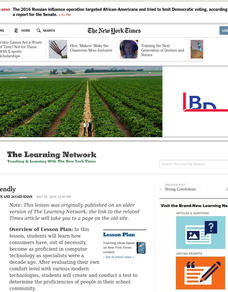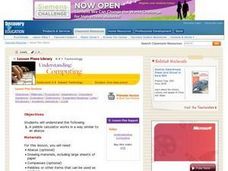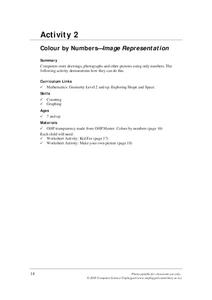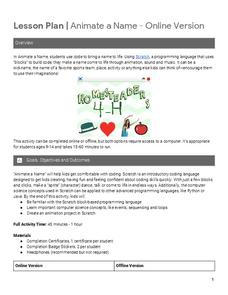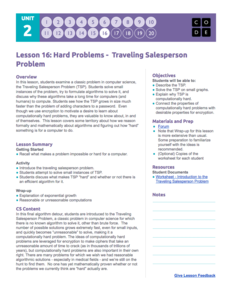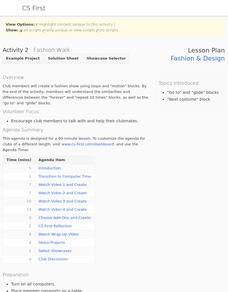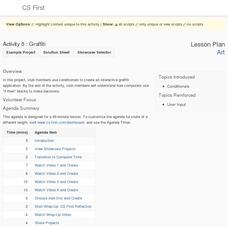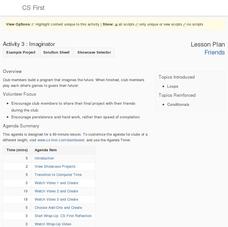Curated OER
Supercomputer Breaks Its Own Record
Students tour the inside of a computer, and then step back in time to meet some of the people who contributed to computing technology's development. They write about the specific innovations they found to be the most interesting.
Curated OER
Learning With Paint And Literature: "Today I Feel Silly"
Students draw a picture related to the book "Today I Feel Silly" using a computer drawing program. They listen to the story and answer discussion questions, view drawings on the teacher's Paint website, and create an illustration of...
Curated OER
Learning With Paint And Literature: "The Magic School Bus Gets Cold Feet"
Students create an illustration of their favorite part of the book "The Magic School Bus Gets Cold Feet" using a computer drawing program. They listen to the story and answer discussion questions, view drawings on the teacher's Paint...
Curated OER
User Friendly
Students explore how consumers have become as proficient in computer technology as specialists were a decade ago. They create and conduct a test to determine the proficiencies of people in their school community.
Curated OER
Write Away
Students examine the effect of computers and other word processing programs have had on traditional forms of communication and expression after reading and discussing the article "Where the Pen is Mightier Than the PC" from The New York...
Curated OER
Understanding: Computing
Students examine how a pebble calculator works and compare it to an abacus. After a discussion on the abacus and pebble calculator and how each works, they construct their own pebble calculators. They determine how to represent...
Curated OER
Protecting Our Native Forests
Students explore environmental awareness by utilizing computer technology. In this ecosystem conservation lesson plan, students read assigned text which describes the current ecological conditions of Hawaii. Students collaborate in...
Curated OER
Environmental and Health Concerns
The idea behind this lesson plan is to introduce learners to the health and environmental issues related to the use of computers. The lecture should include topics such as tendonitis and carpal tunnel syndrome, but information is not...
Curated OER
Computer Programming: Learning Alice Programming
Students examine the Alice Program. In this computer programming lesson plan, students use the drag and drop program method and view a PowerPoint presentation. Students will then create a snowman by using the drag and drop method.
Computer Science Unplugged
Colour by Numbers–Image Representation
How do computers store and send images? Here's an activity that explains one way a computer can compress image information. Pupils decode run-length coding to produce a black and white image. Pairs then work together to code and decode...
TryEngineering
Program Your Own Game
Young computer scientists get to see what it's like to be a software engineer as they use free online software to design a computer game. They play and evaluate games groups created to round out the activity.
Google
Animate a Name
What's in a name? Pupils use the Scratch code blocks to animate letters in a name. They learn about events, sequencing, and loops in computer science by taking part in the project.
Code.org
Minecraft Hour of Code
Devote an hour to computer coding ... it's time well spent! The activity has young computer scientists write code to solve puzzles in the Minecraft game. They learn how to apply block codes and repeat loops.
Code.org
Hard Problems – Traveling Salesperson Problem
Even computers find this to be a hard problem. In the eighth installment of a 12-part unit, young computer scientists learn about the traveling salesperson problem. They formulate algorithms to solve the problem and find out why it is...
Google
Fashion and Design: Fashion Walk
Strut your stuff, just on a computer and not on a fashion runway. Scholars program a fashion show animation using block-based computer coding. They learn how to apply different code blocks in writing their programs.
Code.org
Personal Innovations
Here's a resource designed to serve as an introduction to a computer science course. Groups brainstorm an innovation that may improve technology or use technology to solve a problem. The plan guides the teacher through the introduction...
Microsoft
Conditionals
The conditions are ripe to learn about conditionals. Young computer scientists consider conditionals in their daily lives, then apply their knowledge to computer coding. The fifth of nine parts in the Intro to CS with MakeCode uses...
Google
Art: Graffiti
Your principal won't mind graffiti, as long as it's on a virtual wall. Scholars use the Scratch block-based computer language to write a program on graffiti. The program lets users place certain designs on a wall.
Google
Adventure on the High Seas
Ahoy there! A fun computer science lesson plan challenges pupils to write a program that creates an ocean wave. They then develop stories to accompany their projects. All of this takes place within the Scratch coding program.
Code.org
Introduction to Arrays
How can you store lists in a computer program? The 16th installment of a 21-part unit introduces arrays as a way to store lists within a variable. Individuals program a list of their favorite things—adding interest to the activity.
Code.org
Digital Assistant Project
Scholars apply previously learned skills to create a functional computer program. They produce a digital assistant incorporating string commands and complex conditional logic.
Code.org
Looping and Simulation
Young computer scientists continue programming with while loops by creating a program to simulate coins flipping.
Google
Friends: Imaginator
What does a future as a computer scientist look like? Pupils learn about loops in computer coding by writing a story about the future. They include the repeat until and wait blocks in the Scratch program to incorporate these loops.
TryEngineering
Graphics: Bits and Points
What can a mural teach pupils about computer science? The activity has scholars create a mural on a wall to learn about bitmap and vector graphics. Along the way, they learn about the graphics coordinate system.
Other popular searches
- History of Computers
- Computer Science
- Computer Parts
- Personal Computers
- Computer Skills
- Computer Technology
- Computer Literacy
- Computer Teacher Resources
- Computer Basics
- Computer Research
- Computer Supplies
- Computer Dictionaries





